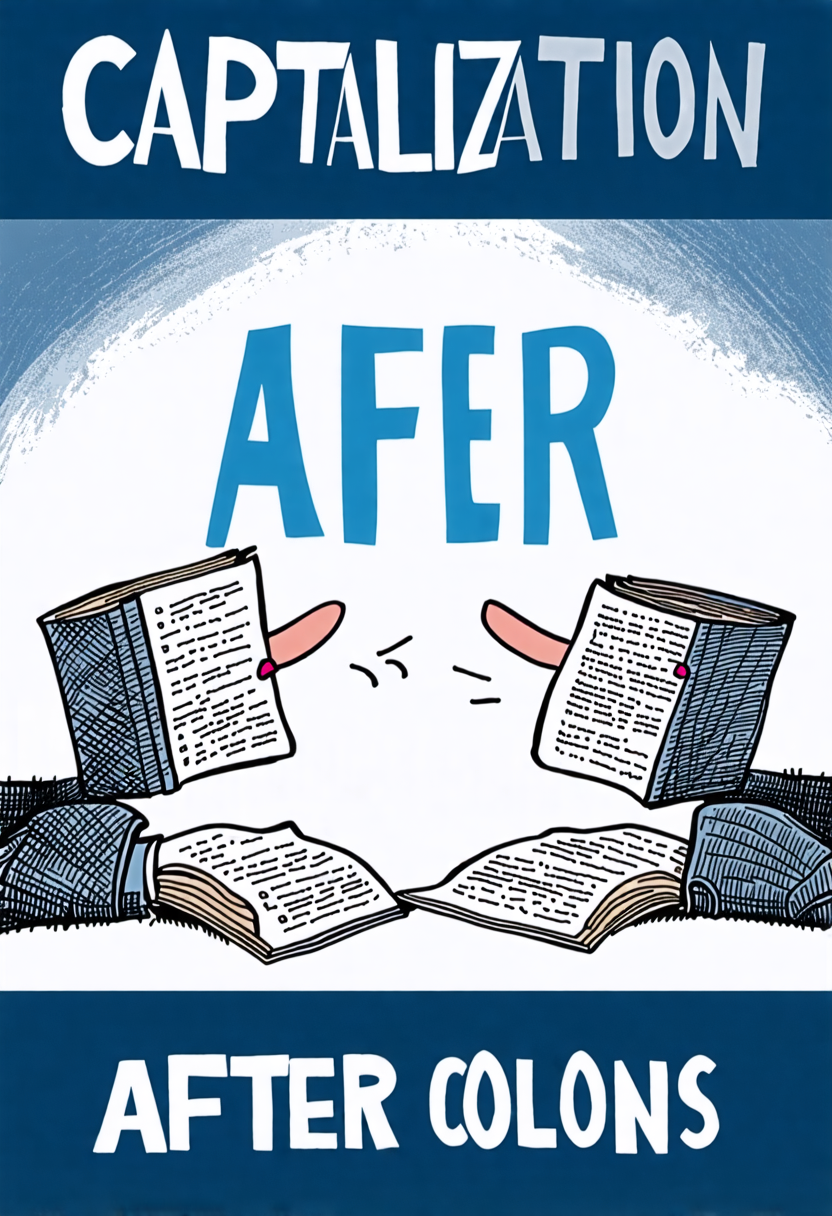Capitalization After Colons
Capitalization after colons depends on context and style guide preferences. In American English, capitalize the first word after a colon if it starts a complete sentence, such as “He had one goal: to win.”
For lists, do not capitalize unless it’s a proper noun, like “There are three pets: a dog, a cat, and Rex.” APA and Chicago formats follow similar rules. In British English, generally, do not capitalize after a colon unless it is a proper noun.
American English Rules
In American English, capitalize the first word after a colon if it begins a complete sentence. This rule helps distinguish complete thoughts and enhances readability.
For example: ‘She had one goal in mind: She wanted to win.’
However, when a colon introduces a list, do not capitalize the first word unless it is a proper noun. An example would be: ‘He needs several tools: a hammer, nails, and a saw.’
The American Psychological Association (APA) format follows this rule, ensuring consistency. Similarly, the Chicago Manual of Style advises capitalizing after a colon only when two explanatory sentences follow.
British English Guidelines
British English guidelines differ slightly from American rules regarding capitalization after a colon. In British English, the first word after a colon is not capitalized unless it is a proper noun or an acronym.
For example, you would write: ‘She brought three items: a book, a pen, and a notebook.’ However, if the word following the colon is a proper noun, it should be capitalized: ‘She visited three cities: London, Paris, and Rome.’
When a colon introduces additional information, the same rule applies. For instance, ‘He had one goal: to win the race.’ This approach helps maintain consistency and clarity in writing.
APA Format Guidelines
How does one adhere to APA format guidelines when it comes to capitalization after a colon?
In APA format, the rule is straightforward. Capitalize the first word after a colon if it starts a complete sentence. This rule helps maintain consistency and readability. For instance, consider the sentence:

‘The results were clear: The experiment was a success.’
Here, ‘The’ is capitalized because it begins a full sentence.
However, if the colon introduces a list or a phrase, do not capitalize the first word unless it is a proper noun. For example:
‘The study required several materials: paper, pens, and calculators.’
Chicago Manual of Style
Why does the Chicago Manual of Style have specific guidelines for capitalization after a colon?
The Chicago Manual of Style (CMOS) aims to provide clarity and consistency in writing. Their guidelines guarantee that writers follow a standard approach, making texts easier to read and understand. CMOS stipulates capitalizing the first word after a colon only if what follows consists of two explanatory sentences.
Here are the key rules according to CMOS:
- Capitalize the first word after a colon if two explanatory sentences follow.
- Do not capitalize if only one sentence or a fragment follows.
- Lists and phrases after a colon should not be capitalized.
- Consistency in applying these rules ensures professional and clear writing.
Lists After a Colon
When introducing a list after a colon, it is important to avoid capitalizing the first word unless it is a proper noun. This rule applies consistently across major style guides like APA and the Chicago Manual of Style.
Proper nouns, such as names of people or places, are the exception and must be capitalized. For example: ‘For the picnic, we need: sandwiches, apples, and bottled water.’ Notice that none of the items are capitalized. This maintains clarity and consistency in writing.
Properly using colons to introduce lists helps guarantee that your writing is professional and easy to read.
Additional Information
Providing additional information after a colon requires careful attention to capitalization rules. Generally, the first word after a colon is not capitalized unless it is a proper noun.
Here are some key points to remember:
- Proper Nouns: Always capitalize proper nouns after a colon.
- Style Guides: Follow specific style guides like APA or Chicago Manual of Style for consistent formatting.
- Clarity: Proper colon usage enhances the clarity of your writing.
- Consistency: Maintain consistency in your capitalization practices to guarantee professionalism.
Complete Sentences
Capitalizing the first word after a colon when it introduces a complete sentence is a common practice in American English. This rule helps guarantee that the statement following the colon is independent and can stand alone.
For instance, in the sentence ‘She had one goal: She wanted to win the race,’ the phrase after the colon is a complete sentence, so the first word is capitalized. This approach follows guidelines from the APA format, which emphasizes capitalization in such cases.
The Chicago Manual of Style also supports this rule but only if two explanatory sentences follow the colon.
Proper Nouns and Acronyms
Proper nouns and acronyms should always be capitalized after a colon, regardless of the context. This guideline guarantees clarity and maintains consistency in writing.
For instance, if a colon introduces a proper noun such as a person’s name or a place, the capitalization is non-negotiable. Similarly, acronyms must follow the same rule for readability.
Consider the following examples:
- Proper nouns: ‘He visited three cities: Boston, Chicago, and New York.’
- Acronyms: ‘The report included data from several agencies: NASA, FDA, and CDC.’
- Titles: ‘She read her favorite books: ‘To Kill a Mockingbird’, ‘1984’, and ‘Pride and Prejudice’.’
- Brand names: ‘The tech event featured major companies: Apple, Google, and Microsoft.’
Style Guide Comparisons
When comparing different style guides, understanding their specific rules on capitalization after a colon is important.
In American English, guides like APA format recommend capitalizing the first word if it starts a complete sentence. For example: ‘She had one goal: To succeed.’
The Chicago Manual of Style, however, only capitalizes if two explanatory sentences follow the colon. For example: ‘He had a choice: He could stay and fight. He could also leave peacefully.’
In contrast, British English typically does not capitalize unless it is a proper noun or acronym.
Both APA and Chicago agree not to capitalize when introducing a list. For example: ‘She needed supplies: paper, pens, and markers.’
Understanding these differences ensures proper adherence to style guidelines.
Writing Clarity and Consistency
To guarantee writing clarity and consistency involves adhering to established rules for colon usage and capitalization. Proper colon usage enhances the readability and flow of text.
Here are key practices to maintain clarity and consistency:
- Follow Style Guides: Adhere to specific guidelines from APA, Chicago Manual of Style, or others to uphold uniformity.
- Capitalize Appropriately: Capitalize after a colon if it introduces a complete sentence, following specific style guide rules.
- List Introductions: Do not capitalize the first word after a colon when introducing a list, unless it’s a proper noun.
- Check for Consistency: Review your text to ensure consistent application of colon usage and capitalization rules.







